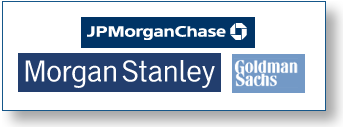 Hidden Swap Fees by JPMorgan Chase, Morgan Stanley Hit School Boards
Hidden Swap Fees by JPMorgan Chase, Morgan Stanley Hit School Boards
By Martin Z. Braun & William Selway – Bloomberg.com (2 Feb 2008)
—
My question is not why do the leading banks and investment banks continue to act this way. I know the answer to that question. They act this way because they can.
They continue to act this way, because we continue to invest in their stocks and bonds, buy their certificates of deposits, use their credit cards, hold brokerage accounts with them, socialize with people who work there, and continue to donate and support charities, school endowments and businesses that will do the same.
Because we will, it makes it much harder for government officials to
disqualify them from doing business in a county, state or a variety of governmental agencies. Indeed that is possible.
There are standards applied to a business that does business with
governmental entities — whether municipalities, government pension funds, state investment boards, licenses to operate within a given jurisdiction.
Why do you have a bank or brokerage account with the largest banks and
investment banks?
Why do you invest in their stocks, bonds, and CD’s?
Why do you invest in mutual funds that invest in their securities?
Why do you treat them and their employees as socially acceptable?
Why will you have these people as clients, friends and lovers?
This is what I can not fathom.


You make a good point, but in the absence of a viable alternative to conventional banking what is one to do? Perhaps we need to form sort of non FDIC affiliated bank, Credit Union, or the like..
It is easy to tell people that they should divest from the Reserve and all that do work with the Reserve. It is another thing to actually do so.
What aspect of our life is not affected by the dollar, or credit in some way? Should we quit a job that transacts mainly on credit? Should we pay with money orders that also benefit the banks even a little? If not then how do we pay bills? Do we not work for companies that have strong ties with banks? If so we all would be unemployed.
Please suggest alternatives.
Great comment just in from a network member:
The time is ripe to transform our financial systems. I believe the current financial system has taken a blow and it is staggering. I hear the famous line from the video game Mortal Combat that I played in my childhood “FINISH HIM”! But the real entrepreneurial challenge is not whether this power structure will fall away, but when and what will take it’s place.
Schools are organized around places. Teachers are generally caring people known and respected in the community through their contribution to our children’s development. Schools contain libraries, information networks, and concentrated intellectual and social capital. They are thought leaders in shaping our youth’s world view. And they are in flux.
Not too long ago the IRS passed new rules in response to ING Group’s fleecing teachers in their retirement plans. (One example in this report [ http://www.403bwise.com/pdf/engdahl_403b_schools.pdf ] illustrates how an investor with $100,000 and competitively priced securities might pay $31,644 in fees and expenses over 20 years, while the products typically sold to teachers run as high as $236,341 for fees and expenses.) The effect of the rule change is that School Districts nearly everywhere have frozen their TSA’s while they come up with a written plan. That means that if honest and competent advisers can get in front of the school leadership and present a fee-only, transparent, fiduciary solution, teachers stand to benefit greatly. If we can introduce some ethical standards to the investment process we can stop, or at least reduce, teachers financing the firms that fleece them by buying their stock and paying their fees.
There is an open architecture, fee or commission platform that any school district has access to called Social(k). http://www.socialk.com while it is not flawless, it does offer access to over 600 mutuals funds including low cost funds like Vanguard. It also includes over 60 “socially responsible” funds. As you have pointed out, SRI is hazardous to our wealth. But short of pulling money out of 403(b)’s altogether and having all those taxes come do, it is a big step forward. And, almost any investment advisor can advise the plan for standardized asset-based fee.
403(b)/TSA rules:
http://search.irs.gov/web/query.html?col=allirs&charset=utf-8&qp=&qs=-Wct%3A%22Internal+Revenue+Manual%22&qc=&qm=0&rf=0&oq=&qt=tsa&search.x=0&search.y=0&search=%26%24self.text%28u%27search%27%29%3B